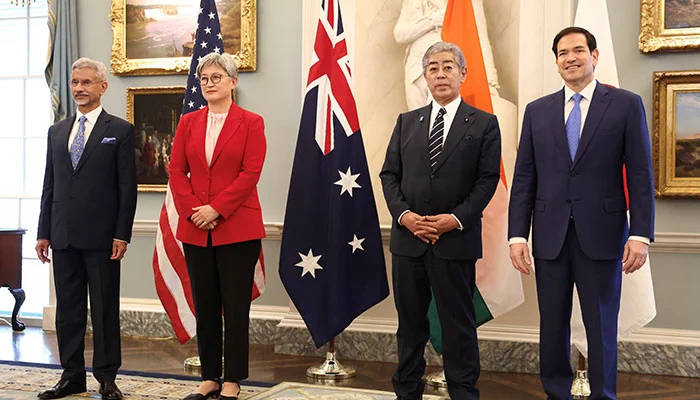WASHINGTON: The Quadrilateral Security Dialogue (Quad) — comprising the United States, India, Japan, and Australia — issued a joint statement condemning the April 22 Pahalgam attack in Indian Illegally Occupied Jammu and Kashmir (IIOJK), but notably refrained from naming Pakistan, despite New Delhi’s claims of Pakistani involvement.
The attack, which killed 26 tourists, sparked a significant military confrontation between Pakistan and India. India accused Pakistan of orchestrating the incident, a charge Islamabad strongly denied, instead calling for an impartial international investigation.
In their statement issued following a foreign ministers’ meeting in Washington, the Quad members said:
“The Quad unequivocally condemns all acts of terrorism and violent extremism in all its forms and manifestations, including cross-border terrorism.”
The group urged all United Nations member states to cooperate fully in holding the “perpetrators, organizers, and financiers” accountable but did not directly reference Pakistan, a diplomatic move interpreted as a measured stance amid regional sensitivities.
Escalation and Ceasefire
The Pahalgam incident led to an 87-hour conflict, during which Pakistan launched “Operation Bunyan-um-Marsoos”, targeting multiple Indian military sites in response to Indian aggression.
According to official sources, Pakistan claimed to have downed six Indian fighter jets, including three Rafales, and dozens of drones, before both countries agreed to a ceasefire on May 10.
The truce was brokered by the United States, with President Donald Trump personally announcing the agreement via social media. While India has downplayed Trump’s role, Pakistan formally acknowledged his mediation and has recommended the former U.S. president for the 2026 Nobel Peace Prize, citing his role in averting a larger conflict between two nuclear-armed neighbours.
The Quad’s carefully worded statement reflects ongoing geopolitical balancing, as members aim to uphold counterterrorism principles without further destabilizing South Asia’s already fragile peace.




